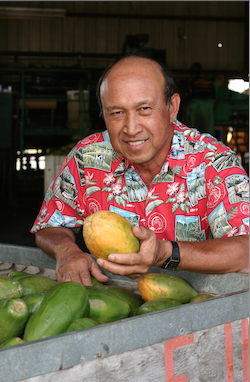Few scientists understand the value of public sector biotechnology better than Dennis Gonsalves.
Gonsalves had just begun his research career at Cornell University when he took a trip back home to Hawaii, where he was born and raised. There, he learned of a virus that was rapidly advancing toward the Big Island’s Puna District, where 95 percent of the state’s papayas are grown.
Aware that the ringspot virus spelled ruin for the small family farms that raise papaya, Gonsalves was determined to find a solution.
We were racing against time, but our motive was to help the growers, he says. The Cornell-based research project began in earnest in 1985 and, within six years, had developed a transgenic papaya resistant to the ringspot virus. The team started field-testing the GE papaya in 1992 the same year the virus arrived in the Puna papaya fields.
It was chaos, Gonsalves recalls. All of the main growing area was being infected.
Within six years, the Hawaii papaya industry had lost half its crop to the virus.
Meanwhile, Cornell researchers were conducting safety trials and completing the maze of paperwork required to deregulate the crop and make it available to farmers.
On May 1, 1998, we released seeds of the [transgenic] Rainbow and SunUp papaya and they were free, Gonsalves said. It was all done by the public sector.
Cornell’s ringspot-resistant papaya now comprises 85 percent of Hawaii’s production. So it literally saved the industry, he says. And it’s really the only public sector transgenic crop that’s been commercialized.

Gonsalves, who is now retired, believes that biotechnology can be a powerful tool to help feed the world, especially for working against disease, and diseases like bacteria, fungi and viruses are a crucial part of food production.
But it remains to be seen whether the technology will be applied to crops that actually feed people, especially in the developing world, Gonsalves says. [The private sector is] gonna keep on improving the big commodity crops where they can make money, which may not be sustainable. If the public sector doesn’t step up and work on the minor crops, the speciality crops, we will lose a lot of the diversity.
Gonsalves has been lauded by farmers, and vilified by anti-GMO activists. When times got tough, he found that focusing on the end goal improving people’s lives made it easier to keep going.
This kind of work is not for the faint-hearted, he says. This kind of work is for people who have a passion to help people.
